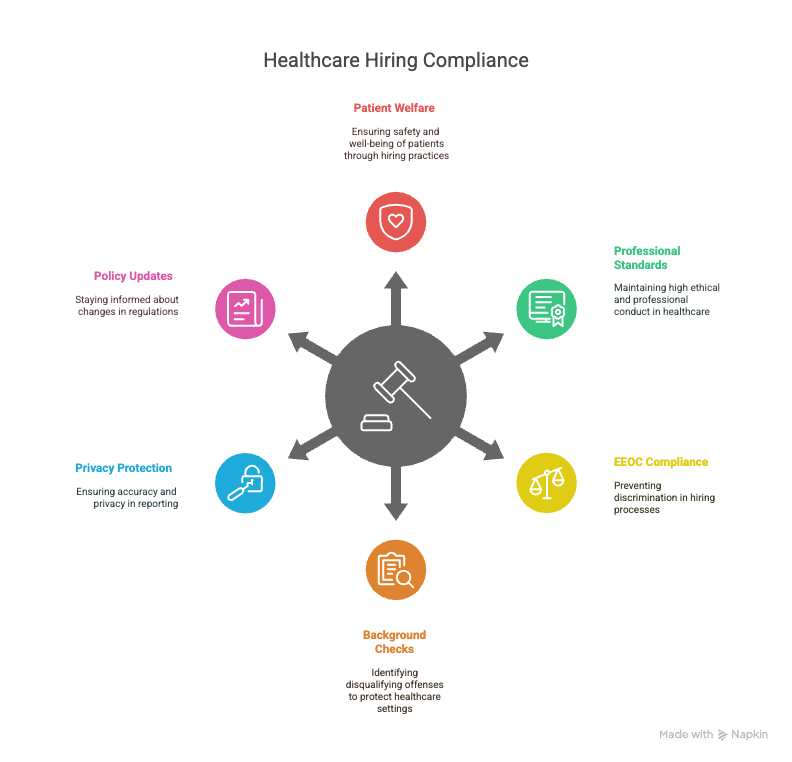Navigating the intricate web of background checks in the healthcare sector can be daunting. Whether you're a healthcare provider, HR professional, or an aspiring nurse, understanding the specifics of North Carolina's requirements is crucial. This guide explores the essentials of North Carolina healthcare background checks, with a focus on DHHS and NCDHHS rules, shedding light on key areas like disqualifications, licensing, and regulations.
Key Takeaways
- Background checks in North Carolina healthcare are crucial to patient safety and trust in facilities.
- Healthcare background checks verify qualifications, check for criminal records, and validate licensure to ensure candidates are fit for their roles.
- The DHHS and NCDHHS set specific standards and oversee background checks to maintain compliance with state and federal laws.
- Preparing for a background check involves gathering necessary documents and addressing any inaccuracies proactively.
- Employers and professionals must stay informed about regulations to ensure safe hiring practices in North Carolina healthcare.
Introduction
Background checks in healthcare aren't just mandatoryâthey're vital. They protect patients, healthcare facilities, and professionals. A thorough background check helps ensure patient safety, strengthens trust in healthcare institutions, and safeguards against potential hiring mistakes. When you step into a healthcare role, you're entrusted with lives. Everyone involved deserves reassurance that you've been vetted comprehensively.
This guide zeroes in on what's specific about North Carolina's requirements. It highlights the rules, processes, and common questions surrounding background checks in the state's healthcare sector. From understanding the roles of DHHS and NCDHHS to dissecting licensing procedures, you'll get a full picture of whatâs needed. This information is essential whether you're navigating this as a provider, an HR professional, or an aspiring nurse looking to enter the field.
Understanding North Carolina Healthcare Background Checks
Background checks in healthcare are your first line of defense against hiring unqualified, unsafe, or unethical professionals. They confirm the credentials and histories of those who'll handle sensitive aspects of patient care. In North Carolina, these checks are not just formalitiesâthey're integral to patient safety and maintaining trust in healthcare systems.
What Are Healthcare Background Checks?
Healthcare background checks are screenings that verify an individual's qualifications and record. They uncover past criminal record issues, confirm education, and validate licensure. In North Carolina, these checks ensure the workforce is not only qualified but also free from issues that might endanger patient safety. For example, verifying past employment ensures a candidate's experience aligns with their claims, while criminal background checks filter out those with histories that pose risks to care environments.
The Role of DHHS and NCDHHS
In North Carolina, the Department of Health and Human Services (DHHS) and the North Carolina Division of Health Service Regulation (NCDHHS) are key players. They set standards that healthcare facilities must meet when conducting these checks. NCDHHS oversees the execution of background checks as part of its regulatory duties. They ensure checks align with both state mandates and federal guidelines, such as those set by the Equal Employment Opportunity Commission (EEOC). The EEOC guidelines advise on legal and fair use of background check information, which DHHS integrates into its policies to protect both employers and potential hires from discrimination.
The Process of Conducting Background Checks
To ensure patient safety and uphold trust in healthcare professions, conducting background checks on potential employees is a critical step in North Carolina. The process interweaves with both state licensing requirements and employer responsibilities.
NC DHHS Licensing Procedures
In North Carolina, the Department of Health and Human Services (DHHS) plays a key role in regulating healthcare licenses. When you apply for a healthcare license, a thorough background check is part of the agenda. This includes criminal history checks through fingerprinting, which are processed by state and federal databases. Felonies or misdemeanors relevant to the job could impact licensing outcomes. Ensuring your record is clear and accurate before applying can save time and stress.
Nurse Background Checks NC
For nursing professionals specifically, the background check is a two-step process. First, there's a review of your application by the North Carolina Board of Nursing, including a criminal history check. Secondly, employers often conduct their checks, which may involve verifying previous employment, credentials, and any actions on your nursing license. If you're coming from out of state, it's crucial to disclose any past issues upfront, as discrepancies can delay or prevent your hiring.
Different healthcare roles may require varying depths of scrutiny. For nurses, patient interaction and handling sensitive information mean a more extensive vetting process compared to other roles. Remember, being transparent with potential employers about past issues can sometimes work in your favor, showing integrity and willingness to rectify previous mistakes.
Being prepared involves gathering relevant documents and understanding common pitfalls, such as missing information or mismatched records. These can be addressed by staying vigilant about updates to your personal history data.
The background check process, while detailed, is designed to ensure only qualified and trustworthy professionals make it into the healthcare field. By preparing thoroughly and complying with all checks, you help maintain the integrity and safety of healthcare in North Carolina.
Regulations and Compliance
To ensure safe hiring practices, healthcare facilities in North Carolina must follow specific legal guidelines. These regulations safeguard patient welfare and maintain professional standards. Facilities need to comply with both state and federal laws, including guidelines from the Equal Employment Opportunity Commission (EEOC) to prevent discriminatory practices in hiring.

North Carolina mandates thorough background checks to identify disqualifying offenses. These offenses may include violent crimes, abuse, and fraud, which would disqualify a candidate from working in healthcare settings. Facilities assessing candidates must balance state-specific requirements with broader federal regulations, such as the Fair Credit Reporting Act, to ensure privacy and accuracy in reporting.
Healthcare institutions must keep abreast of changes in these regulations to remain compliant. Staying informed about policy updates and industry best practices can mitigate risk and protect workplace integrity. Regular training and audits can help you maintain compliance, ensuring that healthcare environments remain secure and trustworthy.
Are your hiring practices aligned with current legal standards? Regular reviews and updates to your background check procedures can safeguard your institution and the people it serves.
Impact on Healthcare Professionals
Preparing for a Background Check
When gearing up for a background check, being organized is your best ally. Start by assembling vital documents such as identification, past employment records, and academic credentials. Familiarize yourself with what your prospective employer will review. This often includes criminal history, work verification, and professional licenses.
Common Challenges
Background checks can sometimes unearth unresolved issues or incorrect data. Candidates often grapple with outdated records that haven't been expunged or errors in identity-related information. If you're aware of potential discrepancies, address them proactively by contacting the relevant institution. Staying one step ahead can save you from future headaches.
Appeals and Rectifications
If an error pops up, North Carolina law provides recourse options. Contest inaccuracies directly with the reporting agency. You may need to present supporting documentation to initiate corrections. Patience is crucial here, as rectification can take time. Remember, a fair and accurate background check is your right.
Conclusion
Understanding the specifics of North Carolina healthcare background checks is essential for both employers and professionals in the field. Implementing these checks ensures only qualified individuals handle patient care, safeguarding both patient safety and trust within the healthcare system.
Healthcare background checks are mandated to ensure that all personnel can be trusted with sensitive health information and patient interaction. For employers, it's important to maintain up-to-date protocols in line with both state and federal laws. This involves familiarizing yourself with the intricacies of DHHS and NCDHHS regulations as they pertain specifically to healthcare roles, including considerations around licensing and potential disqualifications.
For professionals, prepare meticulously before undergoing a background check. Ensure all necessary documentation is in order and be clear about what the check will cover. If errors arise, know the appeals process well and act swiftly to correct any inaccuracies, as even minor discrepancies can delay your career progression.
By staying informed on these procedures and maintaining compliance, both healthcare professionals and employers can contribute to a safe and trustworthy healthcare environment in North Carolina.
Additional Resources
For more in-depth understanding and expert insights on healthcare background checks in North Carolina, explore the following resources:
- North Carolina Department of Health and Human Services (NCDHHS): Visit the NCDHHS website for official regulations, guidelines, and updates specific to healthcare processes in the state. This site offers a wealth of information on licensing requirements and compliance standards.
- Equal Employment Opportunity Commission (EEOC) Guidelines: Familiarize yourself with the EEOC's guide on background checks, which provides crucial advice on legal responsibilities and discrimination prevention during background screenings.
- National Practitioner Data Bank (NPDB): The NPDB database is an essential tool for verifying the credentials of healthcare professionals. Access to this database aids in identifying problematic past behaviors that might not appear on other checks.
- Online Forums and Communities: Join professional groups on platforms like LinkedIn or healthcare-specific forums where industry insiders share their personal experiences, challenges, and tips related to healthcare background checks.
By utilizing these resources, you equip yourself with reliable information, ensuring that both you and your organization stay compliant and foster a qualified healthcare workforce.
Frequently Asked Questions (FAQs)
What disqualifies you from healthcare work in NC?
Crimes involving patient abuse or neglect, fraud, and certain violent or sexual offenses can disqualify you from working in healthcare in North Carolina. Employers typically have specific lists of disqualifying offenses.
How long do NC healthcare checks take?
Background checks for healthcare employment in North Carolina can take anywhere from a few days to several weeks, depending on the complexity of the check and the responsiveness of external agencies.
Does NC require fingerprinting for nurses?
Yes, fingerprinting is required for nurses in North Carolina as part of the background check process to ensure the safety and security of patients.
Can a DUI affect healthcare employment in NC?
Yes, a DUI can affect your healthcare employment, as employers review criminal records to determine your suitability for working with vulnerable populations.
How to appeal a failed healthcare check in NC?
To appeal a failed background check in North Carolina, you should contact the agency or employer that conducted the check. They may provide you with a process to dispute inaccuracies or explain circumstances.
Are out-of-state crimes visible in NC healthcare checks?
Yes, out-of-state crimes can be visible in North Carolina healthcare background checks, as these checks often include national databases.
Do NC temp healthcare agencies require checks?
Yes, temporary healthcare agencies in North Carolina typically require background checks to ensure the safety of their clients and compliance with state laws.
Whatâs the cost of healthcare checks in NC?
The cost of healthcare background checks in North Carolina can vary, often ranging from $20 to $50, depending on the depth and type of check required.
Are expunged records visible to NC DHHS?
Expunged records are generally not visible in background checks conducted by North Carolina Department of Health and Human Services, though it's wise to confirm in individual circumstances.
Does NC check the National Sex Offender Registry?
Yes, North Carolina healthcare background checks include a review of the National Sex Offender Registry to protect patients and ensure public safety.
What documentation do you need for a healthcare background check in NC?
You need to provide identification, such as a driverâs license or state ID, and possibly your social security number for verification.
Can healthcare students in NC be subject to background checks?
Yes, healthcare students in North Carolina may be required to complete background checks before clinical placements.
Are juvenile records considered in NC healthcare checks?
Juvenile records might be considered, especially if they involve serious offenses, but this depends on the employer's policies and the nature of the crime.
Can you request a copy of your NC healthcare background check?
Yes, you can request a copy of your background check report from the agency or employer conducting it to review its accuracy.

GCheck Editorial Team
Meet the GCheck Editorial Team, your trusted source for insightful and up-to-date information in the world of employment background checks. Committed to delivering the latest trends, best practices, and industry insights, our team is dedicated to keeping you informed.
With a passion for ensuring accuracy, compliance, and efficiency in background screening, we are your go-to experts in the field. Stay tuned for our comprehensive articles, guides, and analysis, designed to empower businesses and individuals with the knowledge they need to make informed decisions.
At GCheck, we're here to guide you through the complexities of background checks, every step of the way.





